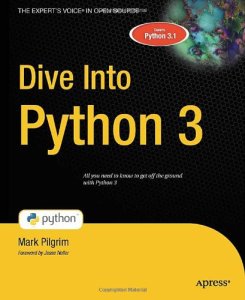
|
FreeComputerBooks.com
Links to Free Computer, Mathematics, Technical Books all over the World
|
|
- Title: Dive Into Python 3
- Author(s) Mark Pilgrim
- Publisher: CreateSpace;; eBook (Creative Commons Licensed)
- License(s): Creative Commons License (CC)
- Hardcover: 496 pages
- eBook: HTML, PDF (459 pages), ePub, and Mobi
- Language: English
- ISBN-10: 1475234031
- ISBN-13: 978-1475234039
- Share This:

|
If you've never programmed before, Python 3 is an excellent language to learn modern programming techniques. But this book should not be your starting point. Get "How to Think Like a Computer Scientist: Learning with Python" by Allen Downey, Jeffrey Elkner, Chris Meyers and learn the basics. Then dive into this book. Dive Into PYTHON 3 was written by Mark Pilgram, and this edition is distributed under the terms of the Creative Commons Attribution Share-Alike License 3.0. * Money raised from the sale of this book supports the development of free software and documentation. About the Author: By day, Mark Pilgrim is a developer advocate for open source and open standards. By night, he is a husband and father who lives in North Carolina with his wife, his two sons, and his big slobbery dog. He spends his copious free time sunbathing, skydiving, and making up autobiographical information.
About the Authors-
By day, Mark Pilgrim is a developer advocate for open source and open standards. By night, he is a husband and father who lives in North Carolina with his wife, his two sons, and his big slobbery dog. He spends his copious free time sunbathing, skydiving, and making up autobiographical information.

- Dive Into Python 3 (Mark Pilgrim)
- The Mirror Site (1) - PDF, ePub, and Mobi
- The Mirror Site (2) - PDF
- The Mirror Site (3) - PDF
-
 Dive Into Python: Python from Novice to Pro (Mark Pilgrim)
Dive Into Python: Python from Novice to Pro (Mark Pilgrim)
This book is your 'desert island' Python book. If you've never programmed before, Python is an excellent language to learn modern programming techniques.
-
 How To Code in Python 3 (Lisa Tagliaferri)
How To Code in Python 3 (Lisa Tagliaferri)
This book is designed to bring developers and others who are anxious to learn Python up to speed quickly. You will learn warts, gotchas, best practices and hints that have been gleaned through the years in days.
-
 Code Like a Pythonista: Idiomatic Python (David Goodger)
Code Like a Pythonista: Idiomatic Python (David Goodger)
This book is a thorough introduction to every feature of the Python language for programmers who are impatient to write production code. You'll dive deep into idiomatic Python patterns so you can write professional Python programs in no time.
-
 Learn More Python 3 The Hard Way (Zed A. Shaw)
Learn More Python 3 The Hard Way (Zed A. Shaw)
This book of 52 hands-on projects is perfect for everyone who's written Python code but isn't yet comfortable taking new ideas all the way to finished software. Each project helps you build a key practical skill.
-
 Python for Everybody: Exploring Data in Python 3
Python for Everybody: Exploring Data in Python 3
This book is designed to introduce students to programming and software development through the lens of exploring data. You can think of the Python programming language as your tool to solve data problems that are beyond the capability of a spreadsheet.
-
 Automate the Boring Stuff with Python (Albert Sweigart)
Automate the Boring Stuff with Python (Albert Sweigart)
Learn how to use Python to write programs that do in minutes what would take you hours to do by hand - no prior programming experience required. You'll create Python programs that effortlessly perform useful and impressive feats of automation.
-
 Problem Solving with Algorithms/Data Structures using Python
Problem Solving with Algorithms/Data Structures using Python
This is a textbook about computer science. It is also about Python. However, there is much more. The tools and techniques that you learn here will be applied over and over as you continue your study of computer science.
-
 Fundamentals of Python Programming (Richard L. Halterman)
Fundamentals of Python Programming (Richard L. Halterman)
It focuses on introducing programming techniques and developing good habits. To that end, our approach avoids some of the more esoteric features of Python and concentrates on the programming basics that transfer directly to other imperative programming.
-
 O'Reilly® Think Python, 2nd Edition (Allen B. Downey)
O'Reilly® Think Python, 2nd Edition (Allen B. Downey)
This hands-on guide takes you through the Python programming language a step at a time, beginning with basic programming concepts before moving on to functions, recursion, data structures, and object-oriented design. 2nd edition updated for Python 3.
-
 Functional Programming in Python (David Mertz)
Functional Programming in Python (David Mertz)
It describes ways to avoid Python’s imperative-style flow control, the nuances of callable functions, how to work lazily with iterators, and the use of higher-order functions. He also lists several third-party Python libraries useful for functional programming.
-
 Python 3 Patterns, Recipes and Idioms (Bruce Eckel, et al)
Python 3 Patterns, Recipes and Idioms (Bruce Eckel, et al)
This book is aimed at more experienced Python programmers who are looking to deepen their understanding of the language and modern programming idioms. It focuses on some of the more advanced techniques used by libraries, frameworks, and applications.





